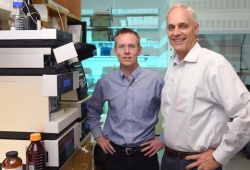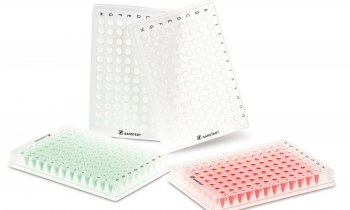Study
A gene that limits desire to drink alcohol
In the largest study of its kind, UT Southwestern Medical Center researchers and colleagues in Europe identified a gene variant that suppresses the desire to drink alcohol.

The findings are based on the largest genome-wide association meta-analysis and replication study to date mapping and comparing the genetics – the DNA – of more than 105,000 light and heavy social drinkers,” said Dr. David Mangelsdorf, Chair of Pharmacology at UT Southwestern and a corresponding author of the study. "The study identified a variation in the β-Klotho gene linked to the regulation of social alcohol consumption. The less frequent variant – seen in approximately 40 percent of the people in this study – is associated with a decreased desire to drink alcohol,” he said.
“Excessive alcohol consumption is a major public health problem worldwide, causing more than 3 million deaths per year,” said Dr. Kliewer, a Professor of Molecular Biology and Pharmacology who holds the Nancy B. and Jake L. Hamon Distinguished Chair in Basic Cancer Research. “Much of the research on alcohol consumption has focused on addiction. However, the overall burden of alcohol-associated disease reflects the total amount of alcohol consumed, not just addiction.”
The European research group knew that the UT Southwestern team had worked on β-Klotho and the liver hormone fibroblast growth factor 21 (FGF21) that binds to the β-Klotho-FGF21 receptor complex. “They asked us to conduct experiments in mice to better understand the role of β-Klotho in alcohol drinking behavior,” Dr. Mangelsdorf said. “The β-Klotho gene directs the production of the β-Klotho protein that forms part of a receptor complex in the brain.”
The PNAS study could lead to development of drugs to regulate alcohol consumption – possibly even in those with drinking problems. Alcoholics were not part of the current study, however.
A shift from heavy to moderate social drinking could have major public health benefits, such as reduced cardiovascular disease risk. Increased alcohol consumption is linked to two heart disease risk factors in particular: high blood pressure and obesity, according to the American Heart Association. This study of genetic influences on brain function affecting drinking behavior indicates the promise of pharmacogenetics, a field of precision medicine that the National Institutes of Health (NIH) describes as the study of how genes affect responses to drugs.
Like many complex traits, the genetic influences on brain functions affecting drinking behavior were thought to be so small that it would be necessary to study large numbers of people in order to detect those genetic variations, said Dr. Mangelsdorf, also Professor of Biochemistry and a Howard Hughes Medical Institute Investigator. Dr. Mangelsdorf holds the Alfred G. Gilman Distinguished Chair in Pharmacology, and the Raymond and Ellen Willie Distinguished Chair in Molecular Neuropharmacology in Honor of Harold B. Crasilneck, Ph.D.
The study compared the genetics of light and heavy social drinkers of European ancestry participating in nearly four dozen other large population studies worldwide. In addition to providing samples for genetic analysis, the participants answered questionnaires on their weekly drinking habits.
Heavy drinking was defined as more than 21 drinks per week for men and more than 14 drinks per week for women. Light drinking was considered to be 14 drinks or less per week for men and seven drinks or less per week for women. A “drink” was the equivalent of a small glass or wine, or a half pint of beer.
The β-Klotho gene codes for the protein β-Klotho, which forms a receptor complex in the central nervous system (the brain and spinal cord) with classic receptors for FGF21, a hormone produced in the liver. “The gene in the current study seems to work via a feedback circuit that goes from the liver, which processes alcohol, to the brain, where β-Klotho and classic FGF21 receptors form a cellular machine, or receptor complex, which binds to the liver hormone FGF21 to signal the response to alcohol,” Dr. Mangelsdorf said.
The less common gene variant identified in this study is related to a decreased desire for alcohol. So, people who have this variant tend to drink less than those without it, he said. In this study, the frequency of the alcohol-decreasing variant among participants was 42 percent.
To better understand how the gene works, the Kliewer-Mangelsdorf lab offered mice genetically unable to produce β-Klotho a choice between water and alcohol. The genetically altered mice preferred alcohol even when they were given the hormone FGF21, indicating that FGF21’s ability to suppress the preference for alcohol depends on the presence of β-Klotho, he said.
This marks the fifth study in which Drs. Mangelsdorf and Kliewer report that the hormone FGF21 directly affects the central nervous system in mice. A study published in December 2015 found that FGF21 works via the brain’s reward pathway to reduce cravings for sugar and that FGF21 needed β-Klotho to function in that signaling pathway. The current study indicates that FGF21 requires β-Klotho in the signaling pathway that suppresses alcohol consumption, he said.
In 2014, they reported that FGF21 acts on the brain to cause weight loss. They also published two studies in 2013 reporting on FGF21’s ability to regulate metabolism, circadian (body clock) behavior, and female reproduction. “This is a hormone with some remarkable pharmacologic effects,” Dr. Mangelsdorf said. “The current study suggests that the FGF21-β-Klotho pathway regulates alcohol consumption in humans and seems to point to a mechanism that we might be able to influence in order to reduce alcohol intake.”
Source: UT Southwestern Medical Center
06.12.2016











